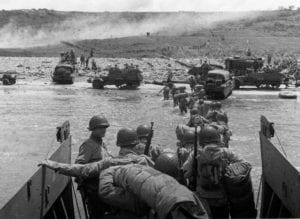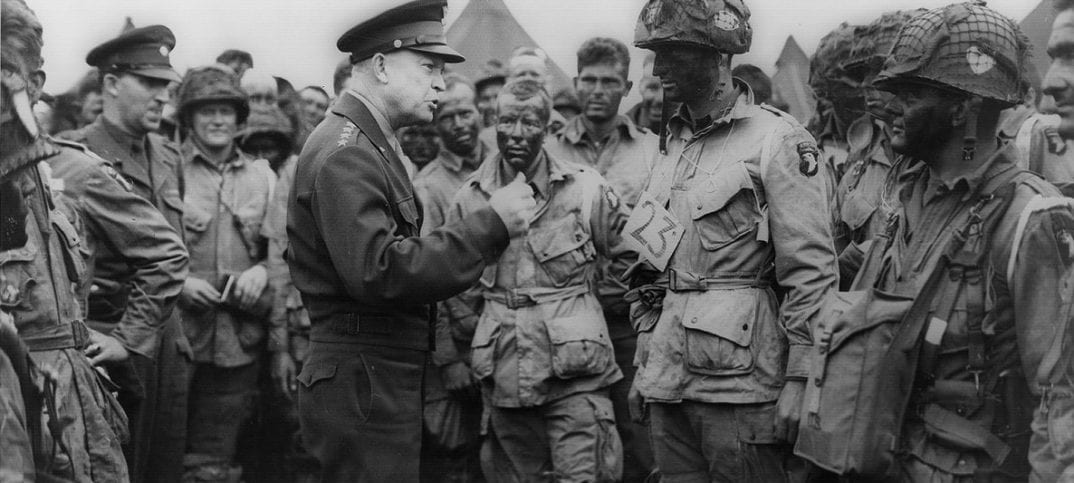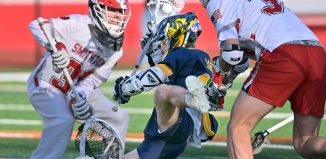How Eisenhower made the choice that would lead to the end of the Third Reich
By Rich Acritelli
In the early morning hours that led up to the D-Day landings, former general and later president Dwight D. Eisenhower had to make one of the most vital military decisions to determine the fate of plans to invade Normandy, France. While tens of thousands of men were waiting on ships that were being loaded with everything from blood to tanks, Eisenhower was delayed by hazardous weather. It was determined that the water conditions were too rough to launch and land the soldiers who were expected to make it ashore with tons of gear and against the fire of the German army. Senior officers Gen. Omar N. Bradley and Field Marshal Bernard Law Montgomery, and chief of staff Gen. Walter Bedell “Beetle” Smith, watched as Eisenhower was completely alone in determining if the Allies should carry out this attack.

As Eisenhower walked around the room, he was briefed by his meteorologist about a brief break in the weather that would possibly allow the Allied landings to reach the beaches of Normandy. The general heard Montgomery’s beliefs that all should be risked at this point. He also learned that if they did not go at this moment, it was likely that the Allies would have to wait until July to attack the shores of France due to poor weather reports. While these forces waited in large numbers, Eisenhower fully understood that Hitler was bound to learn of his plans to attack Normandy. He refused to allow noted Field Marshal Erwin Rommel the time to strengthen the French coastline with additional armaments, fortifications and resources to halt this Allied assault. Even as Eisenhower watched the success of Operation Fortitude’s ability to deceive Hitler of the Allies’ false accounts to attack the French location of Calais in the south and Norway in the north, this was too much of a secret to hold on to much longer.
In Germany, Hitler refused to listen to his generals in allowing flexibility within the deployment of Panzer tanks situated in Calais. Eisenhower tricked Hitler into believing that he would attack Calais, which was the closest French landing spot on the English Channel, but as he prepared for D-Day, the American general continually worried about this information being leaked out to the enemy. These fears were presented through a West Point classmate of Ike. Maj. Gen. Henry J.F. Miller was the commander of the 9th Army Air Force Service Command. He made a serious blunder that could have been extremely costly. Drunk, he was overheard speaking about these sensitive invasion plans in a busy English restaurant. It was described by a younger officer that Miller spoke in an arrogant manner and that he showed no discipline in loudly addressing top secret plans to civilians. Right away Eisenhower questioned him and quickly sent his good friend home to the United States, where he was demoted to his previous rank of colonel.
As he was surrounded by the likes of Prime Minister Winston Churchill, the deposed President of the French Republic Charles de Gaulle and Montgomery, his thoughts were never far away from the rank and file who were tasked to carry out his directives. Although Eisenhower was confident of success against the German army, he feared that his men were bound to suffer heavy casualties against the enemy that was waiting for them at Normandy. At this time, Eisenhower’s son graduated from West Point as a second lieutenant on June 6, 1944, during the very moment that the Allies carried out this risky operation. He was always troubled that he was ordering soldiers younger than his own boy to their possible deaths. To soothe the stress that he felt from his heavy burden of command, Eisenhower smoked almost five packs of cigarettes a day.
There is a famous picture of Eisenhower meeting members of the famed 101st Airborne Division, taken in the hours before he approved the invasion. He was alarmed over the estimated reports that the paratroopers would endure heavy losses. Most of these fears were put to rest when Eisenhower personally asked the airborne where they were from in America, the college teams they followed and their lives before the army. This commanding general always searched for soldiers who were from his own hometown of Abilene, Kansas. Whereas Eisenhower was immensely powerful, he was a well-rounded officer, who enjoyed playing cards and sports, and was extremely well-liked. These junior service members calmly told Eisenhower not to worry about the air drops, as they were determined to defeat the Germans.
Miller’s behavior was contrary to the views of Eisenhower, who preached that every member of the armed forces from private to general was needed to operate as a team to win this war in Europe. The moments leading up to D-Day were perhaps the most difficult that he had to handle through his extensive time in the military and his two-term presidency. Whereas Miller flaunted his rank, he failed to understand that World War II impacted every type of American. Higher command figures like Gen. George C. Marshall lost his stepson during the fighting. Former President Theodore Roosevelt’s younger son Ted was a brigadier general who landed at Normandy and died five weeks after this assault of a massive heart attack. Even FDR’s four sons were all in uniform, where they saw combat duty in Europe and the Pacific.
As he pondered this vital decision, Eisenhower was constantly reminded of the poor conditions as the rain was heard hitting his headquarters in England. With his arms folded behind him, Eisenhower looked at the American and British officers and stated, “The question is, just how long can you hang this operation on the end of a limb and let it hang there?” With the risk of the weather, Eisenhower continued, “I am quite positive we must give the order. I don’t like it, but there it is … I don’t see how we can do anything else.” This directive by Eisenhower cut the tension in the room, as his key air, naval and army officers carried out their D-Day responsibilities. Eisenhower wrote a detailed letter accepting the failure of this operation if his forces were pushed back into the English Channel.
Eisenhower was a spectator observing the military might of this machine that he molded to destroy the might of the German military that waited behind the “Atlantic Wall.” This decision encompassed almost a year of intense training by the United States military and continuous day and nighttime bombing missions that targeted resources, bases, railroad lines and key targets that were able to support the enemy at Normandy. By June of 1944, Eisenhower was a seasoned leader who had learned from his own failures in North Africa and during the hard campaign to take Italy. He was extremely determined to defeat Hitler and drive the final nail in the German war machine to destroy their forces in France and move into Germany to gain a final victory. It was at this moment some 75 years ago that Eisenhower made the successful decision that led to the end of the Third Reich’s reign of terror in Europe.
Rich Acritelli is a social studies teacher at Rocky Point High School and an adjunct professor of American history at Suffolk County Community College.







